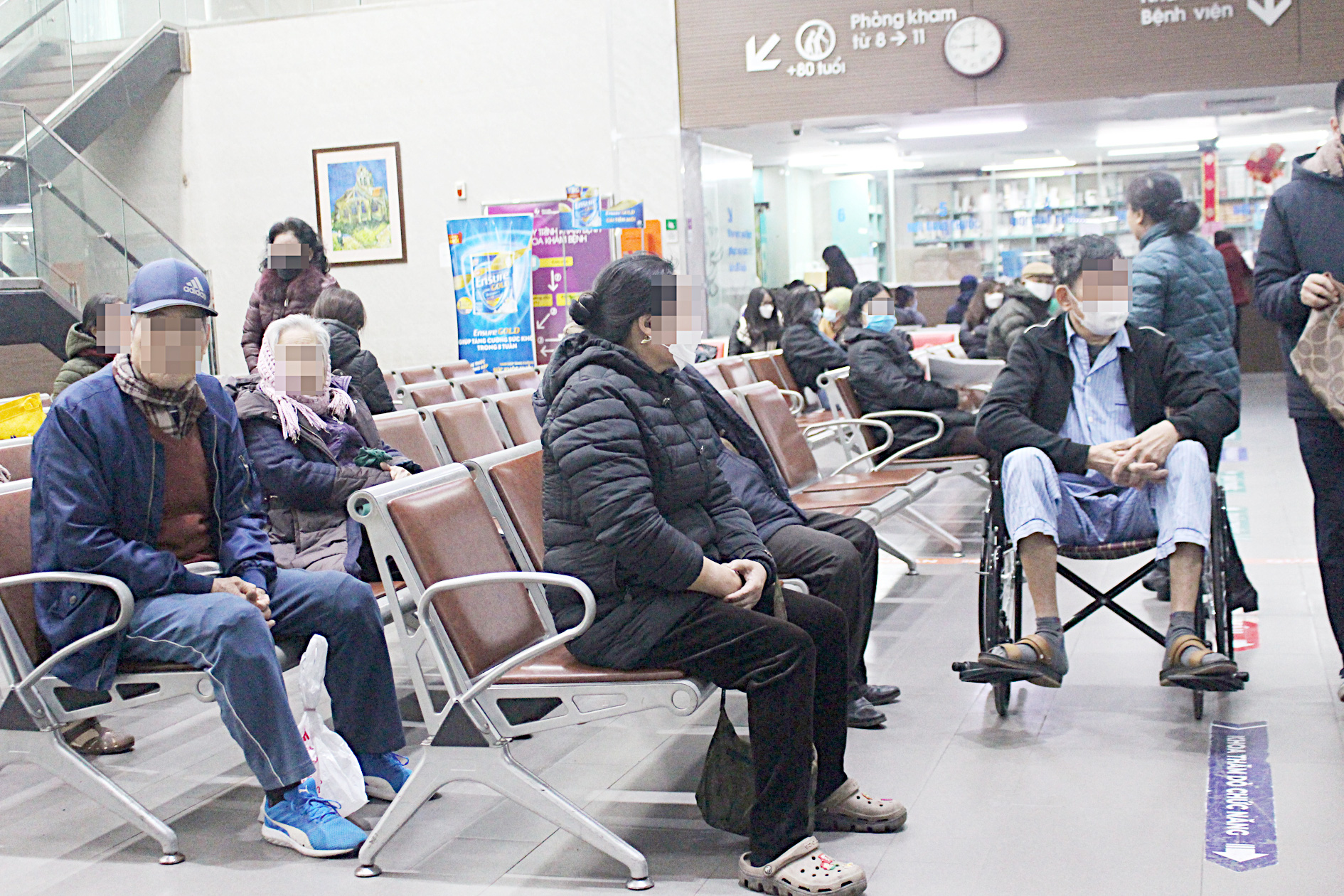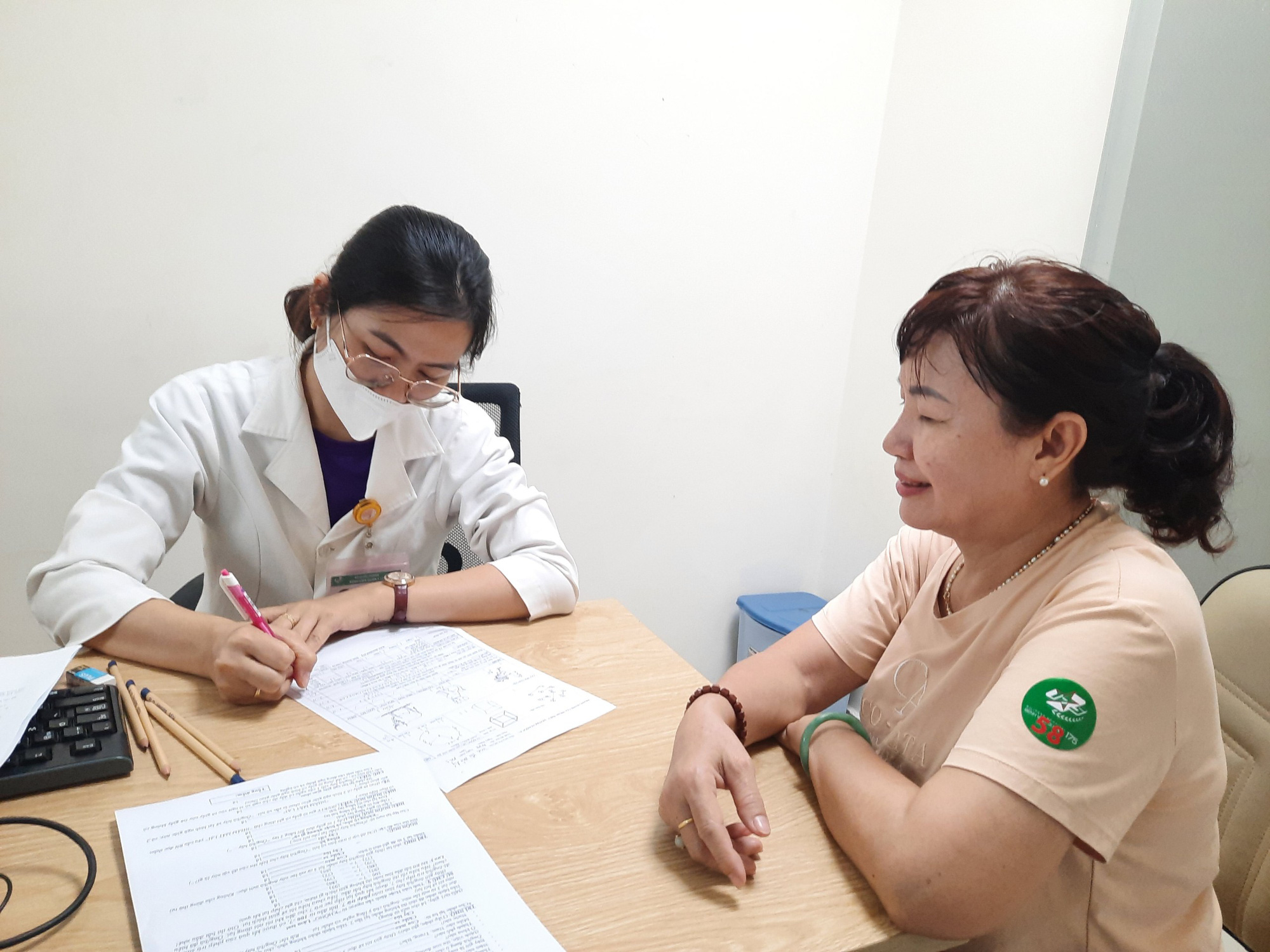
Elderly people visit the Central Geriatric Hospital - Photo: DUONG LIEU
How to care for elderly people with dementia?
When mother suddenly becomes… child
While taking care of her mother with dementia at home, Ms. H. (living in Hanoi) occasionally shares a few pictures of an 80-year-old woman singing, reading poetry and always calling herself "em" to everyone. In her old body, her soul returns to her twenties, sometimes mentioning her father, sometimes mentioning getting married.
Ms. H. said that since her grandmother's illness became more serious, "her mother suddenly became her child." "Sometimes she is like a baby, sometimes like an 18-year-old girl. She often talks about old stories from when she was young, and even always wants to go home because she thinks this is not her home. She is no longer able to take care of her daily activities, everything from brushing her teeth to going to the bathroom requires support and reminders," Ms. H. shared.
Recalling more than 2 years ago, when the whole family did not know that she had Alzheimer's disease, Ms. H. and everyone else just thought that she had senile dementia. Later, when the doctor diagnosed her with Alzheimer's disease, everyone looked back and realized that she had shown signs of the disease before but no one thought about it.
Ms. H. said that back then, her mother often said that her belongings were stolen and then told her daughter-in-law to her son... but people didn't care, they just thought she was "making up stories". There was even a time when they had to hold a family meeting to remind her not to "turn a no into a yes" like that.
"By the time we found out she had dementia, it was already in the advanced stages. The doctor said she had been sick for a long time. The very words we thought she was making up were a symptom of the disease.
The doctor also said that the disease progressed very quickly, but we did not think it would be so fast. In just 2 years since the disease was discovered, at first it was just confusion, now she has completely lost normal cognitive ability.
She is currently prescribed brain tonics, not Alzheimer's treatment support drugs. If I had known about the disease earlier, I would have taken better care of my mother," Ms. H. regretfully recounted.
Mr. LK (87 years old) is also suffering from dementia and is currently taking regular medication. Mr. T. (Mr. K.'s son) said that he first discovered his father was sick after the COVID-19 pandemic.
"That day, my mother called to blame him for leaving her alone for a month. She thought he was joking inappropriately. The next morning, he asked her where she had gone last night.
From such seemingly joking stories, I also noticed that he had many other unusual points. He used to be very good at playing chess, but now he says he can't play. When he went to see a doctor, the doctor diagnosed him with Alzheimer's disease and has been treating him ever since," said Mr. T.

Dementia screening for early detection - Illustration photo
Not just senile dementia
According to Dr. Nguyen Dinh Kien (108 Military Central Hospital), Alzheimer's disease is an irreversible brain disease that gradually destroys memory, language ability and thinking ability. Eventually, patients cannot complete even the smallest tasks. But early detection and treatment can help improve the patient's quality of life.
Dr. Kien said the risk of developing Alzheimer's disease increases with age, starting at around age 65. Many studies have shown that the following factors can promote the development of the disease: people with diabetes; stress, tension, prolonged sadness; high cholesterol; smoking; lack of social interaction.
In the early stages, memory loss is the first symptom of the disease. The patient may have trouble finding words; confuse familiar locations; not pay attention to clothing; take longer to complete daily tasks; have difficulty managing money and bills; have mood and personality changes, and be anxious.
"Caring for Alzheimer's patients is very important. If the patient lives with sympathy, the disease will progress more slowly or at least the patient will not feel hurt because of the indifference of loved ones. Loneliness and feeling hurt are what the patient fears most.
They can sulk, sit in one place and ignore their children and grandchildren even when nothing happens. What they need is care and sincere loving relationships from relatives and people around them.
Therefore, when there are signs of dementia, both family members and patients should take the time to learn about the disease and take care of the patient. At the same time, take the patient to a medical facility for examination and diagnosis as soon as possible," Dr. Kien recommended.
The most important thing is that the patient must be diagnosed early, early intervention will bring higher efficiency. If there are elderly people in the family, you should pay attention to their health to monitor behavioral manifestations. If you detect signs of dementia, you should see a doctor for treatment support.
Elderly people often have many comorbidities that contribute to the progression of dementia. For example, people with diabetes that is not well managed will cause high blood sugar, which will make Alzheimer's disease worse. Therefore, the elderly need to manage their underlying diseases well.
DR. TRUNG ANH
When should medication be used?
Why are many people with Alzheimer's prescribed medication, but others are not?
Talking to Tuoi Tre about this issue, Mr. Nguyen Trung Anh, director of the Central Geriatric Hospital, shared that in Vietnam, there is currently a clearer awareness of this disease.
"We are aiming to detect, diagnose early and take care of patients. In particular, the outstanding issue is to use non-drug measures instead of relying on using drugs, which drugs, and how much," said Mr. Trung Anh.
According to Mr. Trung Anh, usually in mild and moderate cases, the ideal is to combine both non-drug and drug measures.
"When the patient is in the late stage, supportive treatment drugs are almost ineffective. Non-drug measures need to be applied throughout the patient's life from the time of diagnosis.
Non-drug measures include using all treatments to help patients improve their memory, such as participating in club activities, playing chess, reading books, watching TV, etc. These activities help patients train their memory and improve their forgetfulness.
In addition, there is nutritional care and daily activities for the patient. There are patients who forget who they are, whether they have eaten or bathed, so daily care is extremely necessary. In addition to the above non-drug measures, patients use supportive treatment drugs to slow down the progression of the disease," Mr. Trung Anh shared.
For cases where the disease has become severe, according to Mr. Trung Anh, at this stage the drug is no longer effective in supporting treatment. In addition, the drug is often quite expensive, so in the late stages it will not be used to avoid wasting money for the patient.
Source



![[Photo] President Luong Cuong attends the inauguration of the international container port in Hai Phong](https://vphoto.vietnam.vn/thumb/1200x675/vietnam/resource/IMAGE/2025/5/13/9544c01a03e241fdadb6f9708e1c0b65)
![[Photo] President Luong Cuong awarded the title "Heroic City" to Hai Phong city](https://vphoto.vietnam.vn/thumb/1200x675/vietnam/resource/IMAGE/2025/5/13/d1921aa358994c0f97435a490b3d5065)

![[Photo] Many people in Hanoi welcome Buddha's relics to Quan Su Pagoda](https://vphoto.vietnam.vn/thumb/1200x675/vietnam/resource/IMAGE/2025/5/13/3e93a7303e1d4d98b6a65e64be57e870)
![[Photo] Prime Minister Pham Minh Chinh receives Ambassador of the French Republic to Vietnam Olivier Brochet](https://vphoto.vietnam.vn/thumb/1200x675/vietnam/resource/IMAGE/2025/5/13/f5441496fa4a456abf47c8c747d2fe92)


























































































Comment (0)